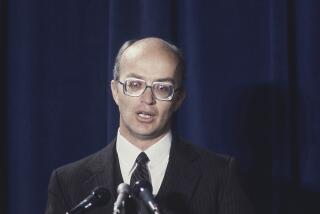PERSPECTIVE ON ROSS PEROT : Is He Jerking Our Chains Again? : He can’t stand aloof from the system he wants to reform; if he’s serious, he’ll have to get in the ring and take his lumps.
Trying to second-guess Ross Perot is as frustrating an undertaking as trying to diagram one of his sentences. Perot could make Lou Costello sound like the model of plain speaking. We still don’t know for sure why he pulled out of the race on July 16 and we can’t be certain that we’ll be any more enlightened if he decides to come out of the neutral corner and fight Round 2; even at that point, should it come, it won’t be clear whether Perot is prepared to slug it out with George Bush and Bill Clinton. Declaring a candidacy, it seems, means something different to Ross Perot than to conventional politicians. But if Perot conceives of his candidacy as nothing more than an expensive lesson in civics, then all Americans--not just his supporters--need to call him to account for once again toying with their emotions.
Both incarnations of Candidate Perot have his concern over the huge budget deficit as their life force. His solutions back in February were a collection of breezy little proverbs and arch observations. By summer, people were clamoring for something more filling than wit and wisdom. Meanwhile, the media were looking into his unusual business practices and his activities as an amateur surveillance expert. What emerged was a picture of Perot as a manipulative eccentric, and he was forced to bow out before the unveiling of his grand deficit-reducing design. When it finally did emerge, it got considerably less attention than it deserved because it was no longer attached to a candidate. Riderless horses don’t get a wreath of roses when they cross the finish. Had Perot been in the saddle, his plan might have enriched the national dialogue.
Budget-cutting is still the centerpiece of Perot’s vision, but now he appears to be on to something bigger: a crusade to elevate and purify the political process. He now seems persuaded that his plan for an “electronic town hall” to reduce the distance between elected officials and citizens should be a permanent feature of American politics and that the use of 800 numbers to register the opinions of Americans is a good cure for alienation and civic passiveness.
It is good that someone is thinking about the cavernous gap that has opened between the rulers and the ruled, and both of Perot’s ideas are worth more than a cursory glance by politicians, but they will get no more than a grunt and a nod if Perot is not in the fight for real. And there is some considerable doubt about the genuineness of his effort.
One very disturbing element in Perot’s resurrected presence is the stipulation that he constantly lays down that the campaign has “nothing to do with personality,” that we should get “off personalities and on to issues.” That is what politicians are fond of saying before they lunge for the ad hominem button. Perot, for obvious and self-serving reasons, really seems to believe that a presidential candidate’s personality should not be a consideration. That is a little like saying that seasonings should have no place in the preparation of a meal. Personalities will be noticed, and no one has the authority to simply rule them out of bounds for discussion.
This tendency on Perot’s part to talk about what he wants to talk about and nothing else casts a cloud over both his comeback and the merits of the reforms that he hopes to introduce. However valuable his ideas and plans are, confining them to the terms that only he will allow is simply not how American politics works. Perot can no more red-shirt the personality question than Clinton can claim immunity on the draft issue or Bush on the economy. And if Perot gets back in in earnest, he has to be prepared to take his lumps. He can’t simply hold himself and his ideas out as a yardstick for measuring the other two candidates and shrink from having himself judged by the traditional templates for presidential stature.
More is at stake here than a cavernous budget deficit or ingenious reforms for the political process. The larger question is one of personal accountability and the moral burden that a presidential candidate bears to refrain from going around jerking the chains of his fellow-citizens while all the time asserting that he is nothing more than the dutiful instrument of their will.
The Uriah Heep model of leadership-- I serve that I may lead--has never been terribly popular with Americans. So if Perot truly cares about the reforms he urges on us, and really wants us to bite the bullet on the deficit, he’s got to come down from the realm of the self-righteous and mix it up in ways that Americans have come to expect. He may have much to offer the political process, but he can’t hold himself aloof from its unruliness, nor from its humbling and humanizing effects.
More to Read
Get the L.A. Times Politics newsletter
Deeply reported insights into legislation, politics and policy from Sacramento, Washington and beyond. In your inbox three times per week.
You may occasionally receive promotional content from the Los Angeles Times.










